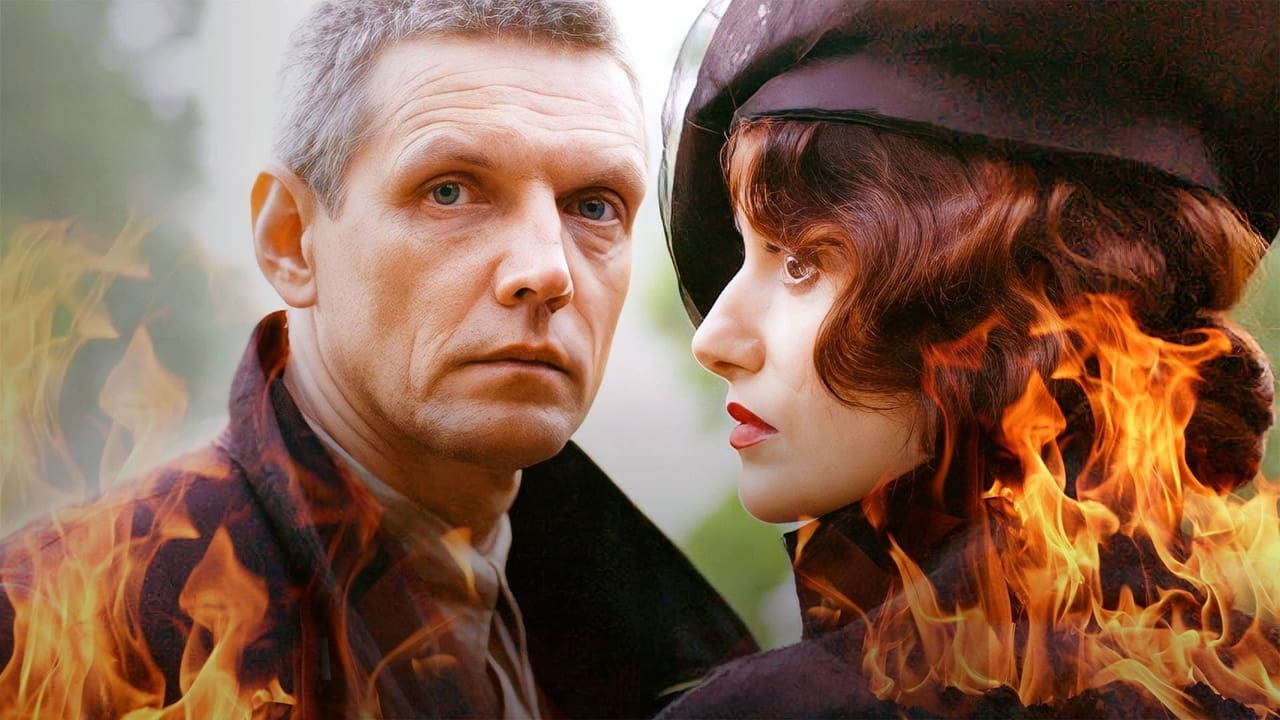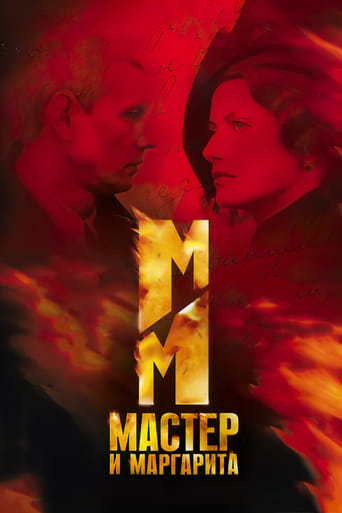LastingAware
The greatest movie ever!
SpuffyWeb
Sadly Over-hyped
DipitySkillful
an ambitious but ultimately ineffective debut endeavor.
Curt
Watching it is like watching the spectacle of a class clown at their best: you laugh at their jokes, instigate their defiance, and "ooooh" when they get in trouble.
Kirpianuscus
just a masterpiece. as adaptation of a masterpiece. the key - high loyalty to the book. and the science to resurrect an universe who becomes fascinating in this trip across characters and magnificent images and spectacular artistic options and wise choices for the portrait of each character. more than a masterpiece, it is a refined delight. and this detail did it great. because it reflects the profound respect of Russian cinema for the national literature. and, in same measure, the science to build a fresco.
hte-trasme
When I watched "Heart of a Dog," a previous adaptation by Vladimir Bortko of another work of Bulgakov's I liked it very much but I thought it missed some of the humor that was entwined with the bitter tragedy of Bulgakov's original. "The Master and Margarita" has no such problem. The original is such an extraordinary, original, and multifaceted piece of work that a comprehensive adaptation would be a fool's errand. What Bortkodoes instead to translate many incidents from the novel and its intertwining stories in a way that approximates its spirit honorably -- and does not supplant or superannuate the novel in any way because it doesn't attempt to, but compliments it instead. Instead of reaching for the unreachable in literally filming this elusive book, Bortko produces a very visual adaptation with an enormous scope. And all these visuals are imagined with inspiration. From time to time its evident that the scope of the visual ambition of the serial is almost beyond its financial means, and we can tell that a lot of blue- screen / CSO was used. Somehow, this doesn't bother me, though -- it seems to add to the otherworldly quality of the proceedings. The cast is really commendable here, above all Oleg Basilashvili as Woland, who does seem to be summoning an infernal power. I've seen him in several different roles now, and it's easy to see this as the crowning achievement of a very skilled actor. And Anna Kovalchuk displays amazing range as the various phases of the eponymous Margarita. Kirill Lavrov seems perfect in the difficult role of Pilate, embodying power gnawed at by weakness, pain, and doubt. I had only seem Vasili Livanov as Sherlock Holmes, and it is great to see him again in a witty performance as Dr Stravinsky. And the animatronic puppetry that went into the realization of Begemot the Cat may not be an actor per se, but it seemed well-imbued with a sense of the absurd and perfectly suited. That sound track could be described as repetitive, but it's repetitive in a thoughtful way, and the use of a theme in a particular place is as carefully thought-out and effective as the use of both monochrome and color scenes to indicate when the presence of the diabolical is making itself felt. And its' simple such a good score that I don't mind that it repeats. "The Master and Margarita" has been called an anti-Stalinist novel, but things are not quite so simple as that (and they are certainly not so simple as to allow us to call it an anti-Communist novel, satirizing as its does the public's vapid enchantment with capitalistic consumer good and raining money). It is rather a work of art (and a great one), and not a work of polemic. And as such it has a deep subtlety in stark contrast to the Socialist Realism endorsed by the state when it was written. This adaptation has the respect and breadth to carry over that theme honestly -- so show us much and to tell us only that the only sin is cowardice.
jan-559
This TV-series of 10 episodes, broadcast at the end of 2005 on the Russian Telekanal Rossiia, scored unprecedented ratings.It was the second attempt of director Vladimir Bortko to film Bulgakov's masterpiece. In 2000 he had already been solicited by the Kino-Most film studio, associated with the competing channel NTV, but at the last moment the company did not succeed to come to an agreement with Sergei Shilovsky, grandson of Bulgakov's third wife, and owner of the copyrights. This time, with Rossiia, it worked. And it did not pass unnoticed.This TV-epopee of more than 8 hours was heavily criticized, or at least regarded with much skepticism, before it was shown on screen. Sometimes it was sincere and well-grounded concern about the authenticity, but sometimes it seemed as if the Bulgakov die-hards behaved like modern Latunsky's by reproaching a movie they hadn't seen yet with sacrilege. Or maybe it was because of the gigantic publicity campaign that was launched to promote the series, and that could give reasons to fear an ambitious, but superficial Hollywood-ish production. But fortunately it wasn't the case.In contrast with the earlier screen adaptation of Aleksandar Petrovic in 1972, director Vladimire Bortko (° Moscow, 1946) followed the book meticulously. If you have 10 times 52 minutes available for it, it is of course, easier than when you're supposed to deliver a 90 minutes movie picture. The setting of a TV-series appeared to be an ideal format to elaborate the complicated, multidimensional work with many different characters. Bortko had already shown his talent with his TV-adaptation of Fyodor Dostoevsky's The Idiot in 2003. Besides, he already filmed another novel of Bulgakov before: "Heart of a Dog", in 1988. He followed the dialogues almost word for word because, so he said, Bulgakov wrote the novel almost like a screenplay.Ik was skeptical too when I saw the DVD at дом книги (Dom Knigi or "House of Books") in Moscow. But curiosity was stronger than skepticism and, frankly speaking, I was pleasantly surprised from the first images. Woland's meeting with Ivan and Berlioz, and the first confrontation of Pilate and Yeshua Ha-Notsri are not only beautifully portrayed and well performed, but in addition they matched remarkably well with the images that I had in mind when I first read the book.The three layers of the novel are reflected more than well, with a well manipulated alternation of colour and black-and-white. The actors are casted accurately and they play the characters faithfully to the novel's intentions that even the most convinced skeptics shut their mouths, despite the huge success – on December 29, 2005 more than 80 million people were watching.Must I find demerits? Well... maybe the depiction of Behemoth then. With the existing technologies it could have been done better, but after all I can only conclude that, even though it is "only" TV, this series doesn't disenchant and its main merit is probably the the fact that Bulgakov now found a much bigger audience than he ever could have had with his books.
Svetlana (Swetushka)
I love the book, Master and Margarita by Michail Bulgakov, and I was pleased to see that this series did not spoil the spirit of the book. The actors are brilliant. Anna Kovalchuk performed very well. The part of Margarita is a very difficult to play. Vladimir Bortko again showed himself as a very talented director. Everybody expected a lot from him after his last brilliant work on the Idiot by Dostoevsky (his previous miniseries). What I did not particularly like was the cat, Begemot. I wish they could do better. The same could be said about some of the special effects which looked very primitive. But, in general, very good job!

